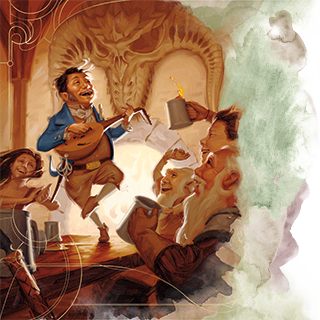
You do not know who you are. You've only what you have on hand to give you any clue as to who you are. Whether that's a holy symbol, a crossbow, a magic tome, there are a lot of things to tell you what you used to be good at, something that is your body's vocation. However, whether you were great or not at it before, you haven't a clue. No matter what, you will have to start at the beginning of it and get your mind in order with what your body naturally wants to do. Whether by curse, magic, damage to your psyche, soul, or your body, you've pushed all of your past memories away, leaving only the very hints of who you were and what you were like. Others may know about you on the roads you travel, people, places, or things might make themselves known of you. But you do not know them. You could never know them as you are now.
- Skill Proficiencies: You do not start with any proficiencies whatsoever.
- Tool Proficiencies: You do not start with any proficiencies whatsoever.
- Languages: Choose one language. (Warning: If you pick this background, you do not get the knowledge of your race's language or any knowledge of Common)
- Equipment: Besides the clothes upon your back and the stuff necessary towards your class, this background's starting equipment is randomized. You cannot choose who you were and the 'free' choices you had made previous to your mind's blanking. Roll 1d100 and 1d20. The d100 will be used in the Individual Treasure table regarding specific challenge ratings, which will determine your starting money. It is recommended to use the challenge ratings as rough equivalent to the level of character that you're creating. The d20, meanwhile, will be rolled regularly to determine your four other items. If you roll an 16-20, you may choose up to 4 mundane non-magical items that you would have on your person. If you roll a 11-15, you may choose up to 3. If it's a 6-10, you may choose up to 2. And a 1-5, you may only choose one.
Above all else, remember that this is under DM discretion. If they do not like the rolls for background equipment, you can always let them choose what you start out with instead.
If notice a different language than any that you already know, you may roll a d20. On a 1-3, you can never know that language outside of hard work and learning. On a 18-20, you remember and realize you do know it. You can make repeated rolls for the same language every long rest, as long as you hear or see it. (i.e. If you hear dwarves speak Dwarven, or perhaps look at Thieves Cant, and do not succeed to learn it, you can always take a long rest, and try again the next day so long as the dwarves are still around to speak it for you or you managed to scribble a copy of Thieves Cant to look at correctly the previous day.)
Whenever you make a proficiency check, for skills or tools, you gain access to a d10 in addition towards your regular d20 for whenever you use your proficiencies on DM discretion. You must roll the d10 after every check whether it succeeds or fails. Whenever you make a successful check, and roll an 7 or higher on the d10, you gain an instance of proficiency for the skill in future checks. Conversely, if you have a failed check, and roll a 4 or lower on the d10, you will roll further checks with those skills at a negative proficiency. (i.e. if you have proficiency of +1,+2, etc. it'd become a -1,-2,etc.) You can stack up to 3 successes/failures in a row before you can only gain instances in the opposite discretion Do note: If you roll a critical 10 on a successful check, you get permanent proficiency, despite repeated usage of the die. In the case of this, you can choose to not continue rolling the d10 for further checks with that skill, but if you do, you will not be able to gain two more instances of possible proficiency. And if you roll a 1 on a failure, you will never be able to use the die again, and forever remove any proficiency you've ever had towards that skill, thus effectively removing that part of your skillset forever
In-game context for features: This is essentially your brain making connections it has forgotten, and shifting as time goes on. You can always remember or forget things as time goes on with how unstable your mind and its recollection is.
Suggested Characteristics
Even if you do not remember who you are, your body does. Your voice and how you act, your tendencies lend credence to who you are. You may not know your name or the faces of your family, but you do know your values.









Comments